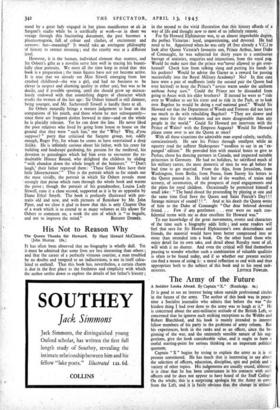His Not to Reason Why
The Queen Thanks Sir Howard. By Mary Howard McClintock. (John Murray. 18s.)
IT has often been observed that no biography is wholly dull. Yet it must be admitted that some lives are less interesting than others ; and that the career of a perfectly virtuous courtier, a man troubled by no doubts and tempted to no indiscretions, is not in itself calcu- lated to enthrall. That this book has, nevertheless, a certain charm is due in the first place to the freshness and simplicity with which the author settles down to explore the details of her father's history ; in the second to the vivid illustration that this history affords of a way of life and thought now to most of us infinitely remote.
For Sir Howard Elphinstone was, to an almost improbable degree, the perfect Victorian: loyal, unquestioning, and devoted. He had need to be. Appointed when-he was only 28 (but already a V.C.) to look after Queen Victoria's favourite son, Prince Arthur, later Duke of Connaught, he was subjected for thirty years to a continuous barrage of anxieties, enquiries and injunctions, from the royal pep. Would he make sure that the prince was'never allowed to get over- heated? Check him from talking slang and putting his hands in his pockets? Would he advise the Garter as a reward for passing successfully into the Royal Military Academy? No? In that case here were a pair of muffiteers (only the second pair the Queen had ever knitted) to keep the Prince's "wrists warm under the uniform without being seen." Could the Prince not be dissuaded from going to Ascot with his elder brothers? If instead he were to " ride over to Windsor to see his sister and to ride in the Park, or to look over Bagshot he would be doing a real national good." Would Sir Howard see that the Department of Woods and Forrests did not have too much to do with rebuilding Bagshot? "They are slower and pay more for their workmen and are more disagreeable than any people in the world." Could Sir Howard not intervene with the Prince of Wales? with the Empress Augusta? Would Sir Howard please come over to see the Queen at once?
With all these situations the admirable man coped calmly, tactfully, conscientiously. He saw his Prince through smallpox while an equerry read the sufferer Shakespeare "needless to say in an ' ex- punged ' edition." He provided him with musical boxes to give to Pashas, chose his dancing partners in Canada, and inspected suitable princesses in Germany. He had no holidays, he sacrificed much of his military career, the most domestic of men he was 46 before he had time to get married. From the Alps, from Jerusalem, from Washington, from Berlin, from Poona, from Surrey his letters to the Queen poured in. He told her of the weather, of trains and scenery, of ceremonies, of the prospects of royal engagements and the plans for royal children. Occasionally he permitted himself a small joke: " The band closed the proceeding by playing at one and the same time God Save the Queen and Saint Patrick's Day!!! Strange mixture of sound! ! ! ". And at his death the Queen wrote of him to the Duke of Connaught " Our dear beloved devoted friend. . . Few if any gentlemen . . . ever were on such con- fidential terms with me as dear excellent Sir Howard was."
To our knowledge of the great movements, events and characters of the time such a biography adds little ; and some readers will feel that save for Sir Howard Elphinstone's own descendants and friends, the material would have been better compressed into an essay than extended into a book. On the other hand those who enjoy detail for its own sake, and detail about Royalty most of all, will wish it no shorter. And even the critical will find themselves pausing to wonder whether such a combination of valuable qualities is often toile found today, and if so whether our present society can find a means of using it: a moral reflection to end with and thus appropriate both to the subject of this book and to his royal task-


























 Previous page
Previous page